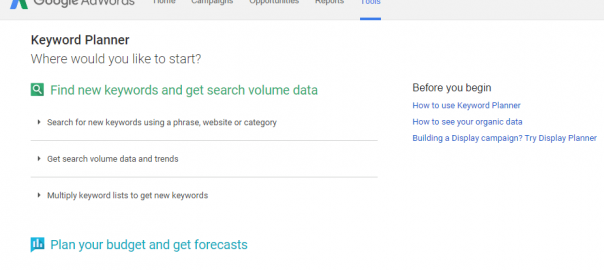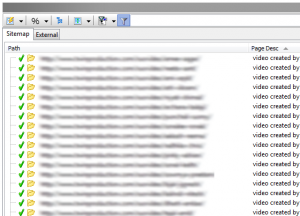How can you get higher CPCs for the clicks on AdSense ads on your sites? By driving traffic to content that Google contextualizes with high-CPC keywords.
But where and how do you find these keywords? We’ve collected a list of keyword tools you can use for AdSense optimization. And a proven process to make it easier.
Why Publishers Need Keyword Research
Most webmasters and content creators assume that keyword research and keyword tools are mainly for marketers and advertisers. They are. But the truth is they can give publishers a lot more if applied right.
- Analyzing Organic Search Traffic – Content that includes keywords with high traffic and low competition will bring you more traffic than high competition and low traffic keywords. This is SEO 101. More traffic means more clicks. We like clicks.
- Long-tail Keyword Exploration – If you’ve done SEO beyond the 101? You’ll know that targeting popular long-tail phrases can get you nice waves of traffic.
- Optimizing for High CPC – I’ve written about optimizing AdSense like a stock broker. So this article is a bit of a “part 2”. In that post, I discussed the overall process, here, I am going to help you fill that AdSense optimization toolkit with a few more useful tools and gadgets.
It’s important to note that most keyword research tools are in fact built for SEO purposes and advertisers, measuring mostly traffic and search engine competition. So you need to look at them from a slightly different perspective and adjust your thinking.
While in SEO the main idea is to target high traffic and low competition long-tails. Here the ideas is quite the reverse. You WANT the keywords with lots of advertiser competition. Even if they don’t bring a lot of search traffic, they’ll make more of each visitor.
If you’re confused at this point, don’t worry. We’ll help you figure it all out.

Analytics and Planning
Before we get down to the actual list of tools and their uses, you need to define your keyword targeting strategy. It very much depends on your traffic sources. What does this mean?
If the majority of your traffic comes from social media, RSS feeds, emails and incoming links? You are in luck! You can target almost ANY keywords and phrases in your niche, just picking ones with the highest CPC. But don’t forget to make sure this is relevant content to your audience.
It’s what your audience (and Google) wants. Otherwise, you risk losing your loyal followers and not to mention that Google doesn’t like to see you spread yourself too wide and publishes you with lower CPCs, which would be counter-productive to our cause.
On the other hand, if your website generates most of its traffic from Google Search results, you’re even luckier. Google likes you enough to send you piles of organic traffic. Let’s take a minute to thank them. Aaaand move on.
What you need to do is analyze the search parameters of your organic traffic, and focus on the keywords and phrases (and even locales!) that generate the highest CPC. And create attractive content that won’t only capitalize on your SERPs, but also on higher paying keywords.
Or you could have mixed traffic, with different sources that fluctuate regularly, and a combination of search traffic, referrals, social media shares and loyal readers via RSS and email. Like most publishers, really. What should you do? Mix and match! And stay current.
Spreading the Sheet
This is a good time to admit that we are addicted to spreadsheets. And so far, it’s done us a world of good. And our advice to you: develop a spreadsheet addiction of your own. Or don’t.

In either case, to manage your keywords for higher AdSense revenues you want to start with a spreadsheet with 2 pages.
One to compare CPCs of keywords that bring in traffic already. And one to list high paying keywords and phrases you want to try and target in your content in the future.
One for analysis, and one for planning. The columns in both are similar: keyword, your current volume of monthly traffic for that keyword and keyword CPC (for advertisers).
If you want, you can add Google’s global search volume data and your SERP data for keywords, but these are not mandatory. Just helpful.
The first thing you want to do is populate some of the first spreadsheet with data from Google Analytics. Include the most popular phrases and keywords that bring people to your page.
In the second spreadsheet start by including search terms you think will bring high CPCs in your niche. You can get some leads in an infographic we included in our post about ways to increase your Google AdSense CPC. Don’t worry about SEO right now, (just don’t copy from the first page) and let yourself go wild.
Now let’s see what online tools you can use to expand these and combine them. And pick the perfect terms and words to target for higher revenues from Adsense clicks.
Tools by the Big G
You can’t say AdSense without saying Google. So obviously, the first tools I talk about have to be Google tools. Even though they aren’t always the most comfortable to use, especially for publishers. But they’re free to use and provide some intriguing information you can’t find anywhere else.
- Google AdWords Keyword Planner This tool is probably the first that comes to mind when exploring the CPC values of keywords and phrases, as well as getting keyword ideas. You’ll need an AdWords account to get access to the Keyword Planner, but it’s free and you really want to get one. Read on and you’ll understand why.What can it do? Quite a bit!
- You can get ideas for related or alternative keywords and phrases by entering a list of keywords with high CPCs you’re thinking of targeting.
- You can compare the CPCs for phrases and keywords in specific locales and languages.
- You can combine keyword lists to get new keyword ideas (remember the two sheets? try combining those once they have enough data).

You don’t really need to pretend to be an advertiser to understand the information this tool gives you. Just remember that what YOU (as a publisher) get is 68% of the CPC you see.
- Google AdWords Display Planner Another tool AdWords advertisers have access to is the display planner. That’s where they can create display campaigns and pick publishers to target. And even specific placements publishers create with custom channels. This little tool is a gold mine for publisher insights beyond just keyword CPC. So put on your aviator glasses and gloves, and let’s go spy on your competitors.

Almost all content hubs can be categorized into one or more topics on Google. You can see who is competing against you for advertisers in the category. Just go to “Find top placement by location” and have fun. You can include multiple related topics and filter out ad units your site doesn’t support. And there they are – the publishers competing with you for high CPCs.Note that historic CPC doesn’t mean much. To get a better idea of what the advertiser CPC would be when targeting that publisher’s real-estate click on the little blue arrow on the right to see the forecast.
But we’re here to talk about keywords, as exciting as it is to peek at what ad placements sites in your category are offering. With the AdWords Display Planner, you can use your list of high-CPC phrases and keywords (page 2 of your beloved spreadsheet) to check the “competition”.
Go to “Get inventory details for your targeting”. Simply enter some keywords, filter locates and ad unit types. And presto! You can get a pretty good idea for CPC of your competitors for various keywords and phrases.

You should play with all the options in this comfortable tool for competitive research. Not just keyword research. And check often.
- Google Translate Global Market Finder If you don’t feel like getting an AdWords account, Google still has a little treat for you. And it’s hiding in a service you wouldn’t expect: Google Translate.This handy little tool lets you check average CPCs across locales. This is especially useful if you run a multilingual site. But note that this will only work with very popular keywords that have a high search volume in the locale. And will show you only the minimal CPC. It is useful in getting ideas for keywords in foreign languages, for the most part.
Our Favorite Keyword Tools
You don’t have to use all of them. Pick the ones you like using, but don’t rely on one for all your data. If you can afford to invest, do so. The paid services usually offer more than the free ones, and pack more features into each service. You can find all the data you need with free tools, but the paid ones will mostly save you research time. Here are some of our favorites, both free and paid.
- SpyFu – from $ 49 a month, very limited free functionality This website offers some interesting features (some are available to everyone) like a list of the highest paying keywords across AdWords. With a paid subscription, you can filter these closer to your niche.SpyFu also offers a nice related and long-tail keyword tool that includes CPC, click-through rates and SEO difficulty for all of them.
This is great for expanding your desired keywords list and mainly a nice service to get all this information in one place.
- Keyword Spy – from $ 89.95, some free functionality and free trial availableThis handy tool is helpful even if you’re not buying the subscription.You can get up-to-date numbers of the movers and shakers bettering on ad space and ads in search results. For example, if you want Amazon.com advertising on your website, check which keywords they’re targeting with the highest CPC.

- keywordtool.io – from $ 48 a month, some free functionalityAs the name implies, this is a keyword tool. But its main advantages are its versatility both in locales and search networks. Remember Bing? No one does, much. Well, you can still use it to get ideas for keywords.
- SEMRush – from $ 69.95, some free functionalityAnother service built around SEO efforts, but a very good tool for AdSense optimization. You can check CPC for phrases that bring you traffic and their related and long-tail phrases as well. In addition, you can see a nice chart showing the differences in CPC across locales.Search volume and the number of competing results can also help you pick those “low hanging fruit” in your list. You can peek at the ad copy for the high-potential keywords in the past few months or weeks to get even more ideas. Also, this is one of the only tools here that can make our beloved spreadsheet obsolete, if you want to rely on SEMRush as your main data-source.
- SEO Chat Suggestion Keyword Finder – FreeThis simple tool will help you expand your list of high CPC keywords to include long-tail phrases with high CPC. You can get really original ideas by letting this tool dig a little deeper down the rabbit-hole of your best performing keywords. It’s important to note it includes suggestions from Bing, Amazon and YouTube.
- Ubersuggest – Free Another similar free tool is Ubersuggest. It’s advantage over SEO Chat is its ability to get suggestions for different locales. So this too is helpful in expanding your keyword lists.
- KeywordBee – One time $ 97 and Free (limited version)Unlike most the tools listed here, this is download rather than an online service. This little app is useful mostly for related keyword research and list expansion as it doesn’t include CPC data.
- Keywordini – Free, Subscription option from $ 497 a month Undoubtedly one of the best free tools for related keywords and CPC information. Just enter a keyword and get a neat report that includes related keywords, their search volume and CPC value. Almost like magic.

- SEO Book – Free with registrationThis tool requires registration, but offers some interesting features like Yahoo and MSN search volume and suggestions. You can also export the keywords to CSV – a feature most services charge for.
- Instakeywords – Free with registrationThis is a useful, free and quick tool to expand your keyword list. Unfortunately, the CPC data for all the keywords we checked was 0, so this is not the tool to rely on in terms of keyword value. Just related keyword research.
- WordStream – from $ 279, Some free functionalityWithout CPC data, this is another tool that can help mostly with keyword list growth as it provides A LOT of suggestions for almost any term. They also let you “nichify” words to create sub-categories in your keyword lists. Which can be helpful if you run a multi-section website.
- Follow – from $ 37 a month, Free version availableAlthough Follow is not really a keyword research tool, it aggregates quite a bit of useful information from various sources, including other tools. You can check your own page to see which keywords bring in most traffic and how valuable they are in CPC terms. You can also do this with competitor websites, if you still have those aviator glasses handy from before.
Putting It All Together
So now you have a fabulous spreadsheet with keywords and their CPC values, and possibly some search volume data too. Now just merge the two pages, sort by CPC and remove duplicates and irrelevant terms. This little treasure, that you should update as often as you can, is your content monetization cheat-sheet.
Next time you’re looking for an idea for a post, or beefing up an existing posts, see if you can include some of these keywords to help Google AdSense contextualize your content for the best paying ads.

But remember! Your audience is the source of your revenue. So keep your content interesting and relevant and don’t spam with keyword-stuffed posts about insurance, lawyers or loans (these tend to have outrageously high CPCs). Well written content that your audience relates to and that Google contextualizes with high paying keywords – That’s where your money is at.
Digital & Social Articles on Business 2 Community(83)







